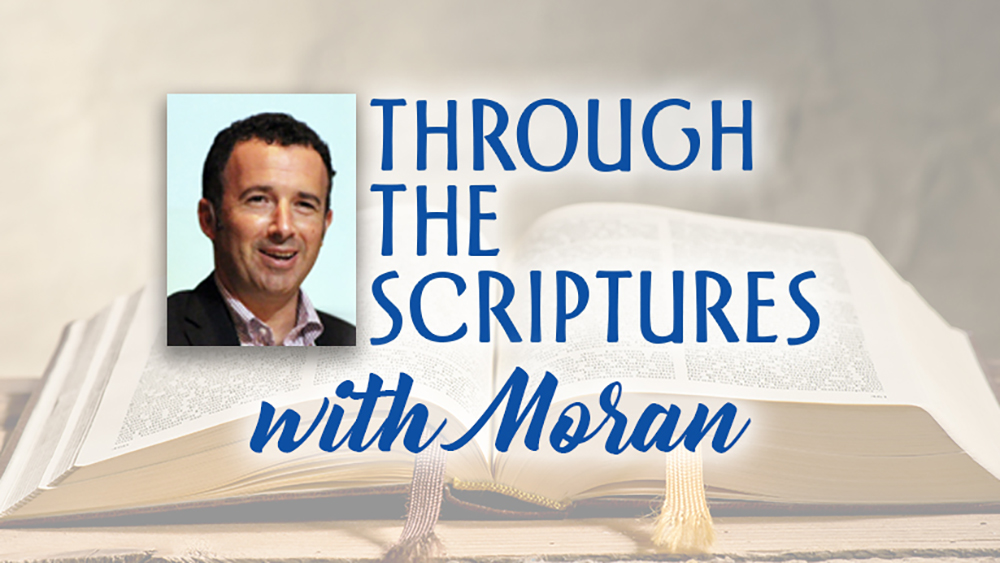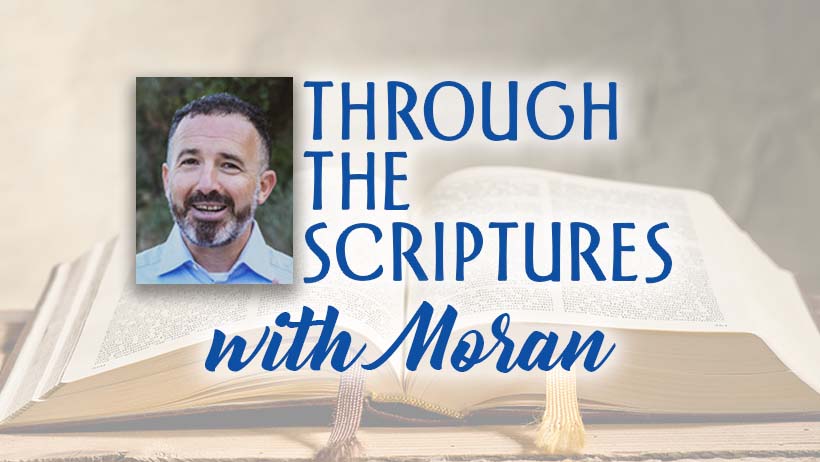
Parashat VaYaqhel (And He Assembled)
& Parashat Pequdei (Accounts Of)
Shemot (Exodus) 35:1–38:20 & 38:21–40:38
Shabbat HaChodesh (Shabbat of The Month) : Exodus 12:1-20
Haftarah: Ezekiel 45:16-46:18
This week we have a special reading for what is known as Shabbat HaChodesh, which is the Shabbat before- or sometimes, the first Shabbat of - the Month of Nissan in which we remember the LORD’s Passover.
In this week’s special reading from Exodus 12:1-20, we read God’s instructions to Moses and Aaron regarding this very special prophetic appointed time:
Now the LORD said to Moses and Aaron in the land of Egypt, “This month shall be the beginning of months for you; it is to be the first month of the year for you. Speak to all the congregation of Israel, saying, ‘On the tenth of this month they are, each one, to take a lamb for themselves, according to the fathers’ households, a lamb for each household. Now if the household is too small for a lamb, then he and his neighbor nearest to his house are to take one according to the number of persons in them; in proportion to what each one should eat, you are to divide the lamb. Your lamb shall be an unblemished male a year old; you may take it from the sheep or from the goats. You shall keep it until the fourteenth day of the same month, then the whole assembly of the congregation of Israel is to slaughter it at twilight. Moreover, they shall take some of the blood and put it on the two doorposts and on the lintel of the houses in which they eat it. They shall eat the flesh that same night, roasted with fire, and they shall eat it with unleavened bread and bitter herbs. Do not eat any of it raw or boiled at all with water, but rather roasted with fire, both its head and its legs along with its entrails. And you shall not leave any of it over until morning, but whatever is left of it until morning, you shall completely burn with fire. Now you shall eat it in this way: with your garment belted around your waist, your sandals on your feet, and your staff in your hand; and you shall eat it in a hurry—it is the Lord’s Passover. For I will go through the land of Egypt on that night, and fatally strike all the firstborn in the land of Egypt, from the human firstborn to animals; and against all the gods of Egypt I will execute judgments—I am the LORD. The blood shall be a sign for you on the houses where you live; and when I see the blood I will pass over you, and no plague will come upon you to destroy you when I strike the land of Egypt.
‘Now this day shall be a memorial to you, and you shall celebrate it as a feast to the LORD; throughout your generations you are to celebrate it as a permanent ordinance. For seven days you shall eat unleavened bread, but on the first day you shall remove dough with yeast from your houses; for whoever eats anything with yeast from the first day until the seventh day, that person shall be cut off from Israel. And on the first day you shall have a holy assembly, and another holy assembly on the seventh day; no work at all shall be done on them, except for what must be eaten by every person—that alone may be prepared by you. You shall also keep the Feast of Unleavened Bread, for on this very day I brought your multitudes out of the land of Egypt; therefore you shall keep this day throughout your generations as a permanent ordinance. In the first month, on the fourteenth day of the month at evening, you shall eat unleavened bread, until the twenty-first day of the month at evening. For seven days there shall be no dough with yeast found in your houses; for whoever eats anything with yeast, that person shall be cut off from the congregation of Israel, whether he is a stranger or a native of the land. You shall not eat anything with yeast; in all your dwellings you shall eat unleavened bread.”
I chose to include the entire section because it is so rich and, while much can be said about the above verses, I would like to connect it to the reading that we have from the Haftarah this week.
In both of the special readings from Exodus and the Haftarah, we find the importance of remembering God’s great acts of wonder and judgment that He did to demonstrate His glory in Egypt. We also see the significance of the lamb offering and its blood, which was used to mark the homes for God to “pass over” them and spare the lives of the firstborn sons. These things are to be remembered throughout the generations, even today.
An interesting person, the prince, enters the picture in Ezekiel’s vision in chapter 44, and the Haftarah mentions the prince in relation to Passover:
All the people of the land shall give to this offering for the prince in Israel. And it shall be the prince’s part to provide the burnt offerings, the grain offerings, and the drink offerings, at the feasts, on the new moons, and on the Sabbaths, at all the appointed feasts of the house of Israel; he shall provide the sin offering, the grain offering, the burnt offering, and the peace offerings, to make atonement for the house of Israel.”
Ezekiel 45:16-17
In the first month, on the fourteenth day of the month, you shall have the Passover, a feast of seven days; unleavened bread shall be eaten. On that day the prince shall provide for himself and all the people of the land a bull as a sin offering. And during the seven days of the feast he shall provide as a burnt offering to the LORD seven bulls and seven rams without blemish on every day of the seven days, and a male goat daily as a sin offering. And he shall provide as a grain offering an ephah with a bull, an ephah with a ram, and a hin of oil with an ephah. In the seventh month, on the fifteenth day of the month, at the feast, he shall provide like these, seven days for the sin offering, the burnt offering, the grain offering, and the oil.
Ezekiel 45:21-25
Who is this prince? And what does this have to do with Passover? How do these elements connect? The answer, I believe, is found in the act of redemption. First, it is interesting to note that the word in Hebrew that has been translated as “prince” is נשיא (nah-see), which is better translated as “President” or a “supreme leader”. In the passages from Ezekiel, we see that the prince, or president, is to provide an offering for himself and the people. This prince is not just any person; he is a leader who has received a very important task which is akin to that of the High Priest. He is to offer sacrifices during God’s appointed times, including the Day of Atonement.
So, it seems that the Prince and the High Priest have the same role, which has to do with redemption. We find an interesting connection in the book of Hebrews:
But when Messiah appeared as Kohen Gadol (High Priest) of the good things that have now come, passing through the greater and more perfect Tent not made with hands (that is to say not of this creation), He entered into the Holies once for all—not by the blood of goats and calves but by His own blood, having obtained eternal redemption. For if the blood of goats and bulls and the ashes of a heifer sprinkling those who have been defiled sanctify for the cleansing of the flesh, how much more will the blood of Messiah—who through the eternal Spirit offered Himself without blemish to God—cleanse our conscience from dead works to serve the living God?
Hebrews 9:11-14
Is it possible that the connection between the prince and the high priest to Passover is that this person will be our eternal Passover Lamb, whose blood will be a mark for God to “pass over” us in His final judgment on this earth? Is it possible that this is yet another incredible connection to our eternal Prince, High Priest, and Leader - Messiah Yeshua?
With the incredible thought that this Prince and High Priest is our eternal Passover Lamb, whose blood will be a mark for God to “pass over” us in His final judgment on this earth in mind, I would like to raise two questions: What does this mean for me? What is my motive to do what I do for His Kingdom?
I would like to close with one final thought from this week’s Parashah portion as we read some of my favorite verses in the Book of Exodus.
“Now Bezalel, Oholiab, and every skillful person in whom the LORD has put skill and understanding to know how to perform all the work in the construction of the sanctuary, shall perform in accordance with everything that the LORD has commanded.” Then Moses called Bezalel, Oholiab, and every skillful person in whom the LORD had put skill, everyone whose heart stirred him, to come to the work to perform it. They received from Moses every contribution which the sons of Israel had brought to perform the work in the construction of the sanctuary. And they still continued bringing to him voluntary offerings every morning. And all the skillful people who were performing all the work of the sanctuary came, each from the work which they were performing, and they said to Moses, “The people are bringing much more than enough for the construction work which the LORD commanded us to perform.” So Moses issued a command, and circulated a proclamation throughout the camp, saying, “No man or woman is to perform work any longer for the contributions of the sanctuary.” So the people were restrained from bringing any more. For the material they had was sufficient and more than enough for all the work, to perform it.”
Exodus 36:1-7
At times I feel like we His followers put a yoke on ourselves when it comes to doing the work of the Lord, where we feel obligated to serve Him. Rather than serving Him from a place of freedom that He has given us, or from our hearts because we understand His amazing love for us, serving Him can be a “box” that we begrudgingly check off. We should learn from the people of Israel who gave freely and joyfully, and who demonstrated their love for Him through their actions.
Shabbat Shalom,
Moran
Check out previous blogs on this parashah!
Share this Post


2 Comments on “A Passover Prince”
Moran, thank you for this passage about the Passover Prince! Thank you for asking this connection to Messiah Yeshua. Thank you for your insights and your valuable ministry.
God’s blessings,
Heidi Nogy
(Experience Israel 2023)
Correction:
*MAKING this connection, not ASKING this connection .
Sorry about my auto-correct!